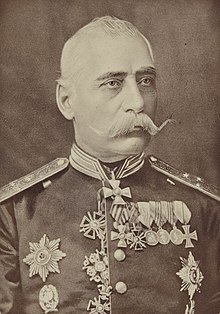The first chapter of Raffi’s famous novel The Fool (1881) features one of the victorious generals of the Russo-Turkish War of 1877-1878, Arshak Ter-Gukasov (Arshak Ter-Ghukasian).
Ter-Gukasov was born in Tiflis (Geogia) in 1819 to an Armenian family of clergymen originally from Shamkhor, in the historical Armenian province of Utik, today in Azerbaijan. He attended the Nersesian School and then continued his education in Saint Petersburg, where he studied at the St. Petersburg State University of Communication. He graduated in 1839 and was assigned, as an engineer, to build roadways for the Russian army in the Caucasus (1842–1850).
He joined the Russian military in 1850, becoming part of the Apsheron 3rd Infantry Regiment. Due to his success in battles, notably in engagements with Chechen and Daghestani tribesmen, he was promoted to the rank of general in 1859. In August of that year, Ter-Gukasov was part of the siege of Gunib, when Imam Shamil, leader of the Chechen and Daghestani, made his last stand against the Russians. The Armenian general was bestowed the Order of St. George.
In 1865, Ter-Gukasov was promoted to the rank of major general and given the 19th artillery division under his command. He also assumed the position of district-governor of the Terek province. In 1866 he was appointed as commander to the 38th Infantry Division and promoted to the rank of lieutenant–general in 1874.
Ter-Gukasov was one of the four Armenian commanders that led the Russian Caucasus Corps, composed of about 50,000 men, in the Russo-Turkish war of 1877–78. The forces under his command, numbering about 13,000 soldiers and stationed near Yerevan, initiated the first assault into Ottoman territory (Western Armenia) by capturing the town of Bayazid. on April 27, 1877. Russian forces capitalized on this victory and took the region of Ardahan in May, while launching an attack on Kars, which was repelled by Ottoman reinforcements. Along the way to Erzerum, Ter-Gukasov managed to capture the villages of Karakilise, Diadin, and the valley of Alashkert, and defeated the much larger Ottoman army.
However, on June 15, Ter-Gukasov received orders to retreat to Igdir to replenish his supplies and ammunition. Twenty thousand Armenian refugees, fearing a massacre if left unprotected, followed the retreating soldiers. After repelling the Turkish attacks along the line of retreat, Ter-Gukasov safely passed through Russian territory. However, Ismail Shah, a Kurdish chieftain based in Van, launched a new offensive toward Bayazid, which had a small Russian garrison. Ter-Gukasov marched to Bayazid on July 8 to assist in its defense and successfully repelled Ismail Shah’s troops. His action was a key factor that helped Russia keep a hold on the city and turned the tide of war in its favor. Owing to these efforts, Ter-Gukasov was awarded the Order of the White Eagle and the 3rd class of the Order of St. George. In November he defeated Ottoman general Muhtar Pasha in a decisive battle at Deveboynu, which allowed the capture of Kars by Armenian general Ivan Lazarev on November 18, 1877.
After the Russo-Turkish War ended with a Russian victory, Ter-Gukasov was appointed commander of troops in Transcaucasia and later assigned as commander of the Caucasian Corps. He was ascended to the rank of General-Adjutant.
By this time, however, his health had greatly deteriorated. He traveled abroad for medical treatment for a year, which ultimately failed. After returning to Tiflis, he died on January 8, 1881.
Arshak Ter-Gukasov was buried in St. Kevork Armenian Cathedral of Tiflis next to the Russian-Armenian military commanders he fought along during the Russo-Turkish War: Mikhail Loris-Melikov, Ivan Lazarev and Beybut Shelkovnikov.

